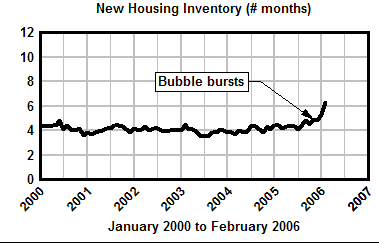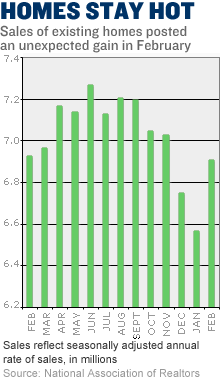
Dynamics

|
Generational Dynamics |
| Forecasting America's Destiny ... and the World's | |
| HOME WEB LOG COUNTRY WIKI COMMENT FORUM DOWNLOADS ABOUT | |
This appears to confirm that the housing bubble burst four months ago.
According to a new report by the Census Bureau and Dept. of Commerce, new home sales fell 10.5% last month, the biggest decline since April 1997, and far bigger than the 2% decline that analysts had predicted.
The decline is the fourth in a row, and follows a 5.3% decline in January.
Along with the decline in sales, prices for new homes have been falling as well. Median prices fell 1.6% from January to $230,400, down from the all-time high of $243,900 in October.
 |
The above graph, based on Commerce Dept. figures, shows that sales and prices have generally been increasing steadily since 2000, during the heart of the "housing bubble," but that they both started a sharp decline in October.
 |
The adjoining graph shows the same thing a different way. Since 2000, the housing inventory has remained steady at about four months, meaning that it takes about four months to sell a home once it comes on the market. Starting in June, the housing inventory began to build, and in February it was well over six months.
This two-month increase in housing inventory implies that the fall in sale and prices is likely to continue. There are an increasing number of unsold new houses on the market. If sales are still dropping off, even in that atmosphere, then buyer psychology must have changed significantly.
Pundits are generally unfazed by these developments. On Saturday, I watched a young girl on CNN, whom I won't name to spare her further embarassment, bubble and gush about how wonderful the economy was, with the stock market going up and the sales of existing homes going up.
The stock market, as I've written a number of times, is still overpriced by a factor of over 220%, over its book value of DJIA 4500, so that an increase makes it even more overpriced.
 |
As for sales of existing homes, they don't quite tell the story the the pundits are claiming, as the adjoining graph shows. It's true that existing home sales were sharply up in February, that followed two months of even sharper declines. The February figure is still well below the November figure, which itself is down from the peak in September and October.
It's also worth understanding that existing home sales figures are often less reliable than new home sales. The reason is that new home sales are counted when the contract is signed, while existing home sales are counted when the final closing takes place, which is often two months later. Thus, existing home sales figures are often two months out of date, and new home sales figures serve as leading indicators of what's coming.
Frankly, the first two graphs above seem very dramatic to me. A sharp fall in sales and prices for one or two months is typical of market fluctuations, but when it lasts four months and appears to be accelerating, then something beyond a simple fluctuation seems to be happening.
Since 2002, Generational Dynamics has predicted that we're entering a new 1930s style Great Depression. This is an example of a "long-range prediction," in that it's based on analyzing patterns over many decades or even centuries. It tells you something that's going to happen with 100% certainty, but does not give a time frame more precise than a couple of decades.
Predicting a specific time for a financial crisis is impossible, as can be proved using the mathematics of Chaos Theory. But what can be done is to combine short-term trends with long-term forecasting to come up with a probabilistic short term forecast -- that is, a prediction that's less than 100% certain, but which provides a more specific time frame. It's this trade-off between time frame and probability that I've been developing on this web site, and it's why I've never gotten a prediction wrong. As long as you don't follow the rules dictated by Chaos Theory, then you can be successful making predictions.
So what we have now is this: A prediction of major financial crisis that's 100% certain but not specific as to time; but there's more, as time goes by, it becomes increasingly probably on a month by month or day be day basis. We also have various "short-term" indicators: the stock market is increasingly overpriced; the housing bubble seems to have burst, and sales and prices seem to be falling rapidly; the the trade deficit keeps increasing exponentially; the Tokyo stock exchange is becoming increasingly volatile; and Japan's plans to raise interest rates are threatening the "carry trade" bubble.
These short-term indicators are all trending in the same direction,
and they're all supportive of the long-term prediction (financial
crisis, 1930s style Great Depression). Perhaps all the short-term
indicators will turn around, and the financial crisis won't begin
until next year or later; but the probability is increasingly higher
that the financial crisis will begin much sooner than that.
(26-Mar-06)
Permanent Link
Receive daily World View columns by e-mail
Donate to Generational Dynamics via PayPal
Web Log Summary - 2016
Web Log Summary - 2015
Web Log Summary - 2014
Web Log Summary - 2013
Web Log Summary - 2012
Web Log Summary - 2011
Web Log Summary - 2010
Web Log Summary - 2009
Web Log Summary - 2008
Web Log Summary - 2007
Web Log Summary - 2006
Web Log Summary - 2005
Web Log Summary - 2004
Web Log - December, 2016
Web Log - November, 2016
Web Log - October, 2016
Web Log - September, 2016
Web Log - August, 2016
Web Log - July, 2016
Web Log - June, 2016
Web Log - May, 2016
Web Log - April, 2016
Web Log - March, 2016
Web Log - February, 2016
Web Log - January, 2016
Web Log - December, 2015
Web Log - November, 2015
Web Log - October, 2015
Web Log - September, 2015
Web Log - August, 2015
Web Log - July, 2015
Web Log - June, 2015
Web Log - May, 2015
Web Log - April, 2015
Web Log - March, 2015
Web Log - February, 2015
Web Log - January, 2015
Web Log - December, 2014
Web Log - November, 2014
Web Log - October, 2014
Web Log - September, 2014
Web Log - August, 2014
Web Log - July, 2014
Web Log - June, 2014
Web Log - May, 2014
Web Log - April, 2014
Web Log - March, 2014
Web Log - February, 2014
Web Log - January, 2014
Web Log - December, 2013
Web Log - November, 2013
Web Log - October, 2013
Web Log - September, 2013
Web Log - August, 2013
Web Log - July, 2013
Web Log - June, 2013
Web Log - May, 2013
Web Log - April, 2013
Web Log - March, 2013
Web Log - February, 2013
Web Log - January, 2013
Web Log - December, 2012
Web Log - November, 2012
Web Log - October, 2012
Web Log - September, 2012
Web Log - August, 2012
Web Log - July, 2012
Web Log - June, 2012
Web Log - May, 2012
Web Log - April, 2012
Web Log - March, 2012
Web Log - February, 2012
Web Log - January, 2012
Web Log - December, 2011
Web Log - November, 2011
Web Log - October, 2011
Web Log - September, 2011
Web Log - August, 2011
Web Log - July, 2011
Web Log - June, 2011
Web Log - May, 2011
Web Log - April, 2011
Web Log - March, 2011
Web Log - February, 2011
Web Log - January, 2011
Web Log - December, 2010
Web Log - November, 2010
Web Log - October, 2010
Web Log - September, 2010
Web Log - August, 2010
Web Log - July, 2010
Web Log - June, 2010
Web Log - May, 2010
Web Log - April, 2010
Web Log - March, 2010
Web Log - February, 2010
Web Log - January, 2010
Web Log - December, 2009
Web Log - November, 2009
Web Log - October, 2009
Web Log - September, 2009
Web Log - August, 2009
Web Log - July, 2009
Web Log - June, 2009
Web Log - May, 2009
Web Log - April, 2009
Web Log - March, 2009
Web Log - February, 2009
Web Log - January, 2009
Web Log - December, 2008
Web Log - November, 2008
Web Log - October, 2008
Web Log - September, 2008
Web Log - August, 2008
Web Log - July, 2008
Web Log - June, 2008
Web Log - May, 2008
Web Log - April, 2008
Web Log - March, 2008
Web Log - February, 2008
Web Log - January, 2008
Web Log - December, 2007
Web Log - November, 2007
Web Log - October, 2007
Web Log - September, 2007
Web Log - August, 2007
Web Log - July, 2007
Web Log - June, 2007
Web Log - May, 2007
Web Log - April, 2007
Web Log - March, 2007
Web Log - February, 2007
Web Log - January, 2007
Web Log - December, 2006
Web Log - November, 2006
Web Log - October, 2006
Web Log - September, 2006
Web Log - August, 2006
Web Log - July, 2006
Web Log - June, 2006
Web Log - May, 2006
Web Log - April, 2006
Web Log - March, 2006
Web Log - February, 2006
Web Log - January, 2006
Web Log - December, 2005
Web Log - November, 2005
Web Log - October, 2005
Web Log - September, 2005
Web Log - August, 2005
Web Log - July, 2005
Web Log - June, 2005
Web Log - May, 2005
Web Log - April, 2005
Web Log - March, 2005
Web Log - February, 2005
Web Log - January, 2005
Web Log - December, 2004
Web Log - November, 2004
Web Log - October, 2004
Web Log - September, 2004
Web Log - August, 2004
Web Log - July, 2004
Web Log - June, 2004